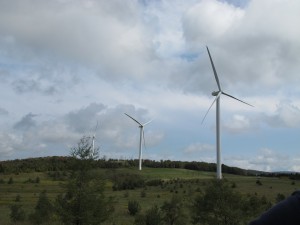DEP’s climate change plan doesn’t set goal to reduce emissions
-
Marie Cusick
A draft update of Pennsylvania’s Climate Change Action Plan lacks a specific target for reducing greenhouse gas emissions.
The state’s previous Action Plan–published by the Department of Environmental Protection in 2009– set an emissions reduction target of 30 percent by the year 2020.
According to the DEP, there is no target this time because state law does not require one.
The new plan is the second in a pair of legally-mandated reports about climate change. As StateImpact Pennsylvania has previously reported, the publication of both documents has been fraught with problems.
“We need a goal”
Rep. Greg Vitali (D- Delaware) is a strong supporter of environmental causes. He believes the Action Plan has very little action it, since there is no target for reducing emissions.
“We need to know what the goal is and how to get to the goal,” he says. “This was done in 2009. It should be done again. It’s just so basic.”
A 2008 law known as the Pennsylvania Climate Change Act requires the DEP to publish two climate reports. The first documents were released in 2009 and updates are required every three years– the new reports were due in 2012.
One report is an overall assessment of how climate change will impact the state. The DEP quietly published it two months ago.
The second report—the Action Plan– is nearing completion.
George Ellis, president of the Pennsylvania Coal Alliance, serves on the DEP’s Climate Change Advisory Committee (CCAC). The group provides recommendations to the agency about the reports.
He says the emissions reduction target in the 2009 plan was controversial at the time.
“The vote was a non-binding target. The vote was not viewed as a goal, more as a measurement tool.”
“It’s late”
Environmental attorney, Mark Hammond, co-chairs the CCAC. At a meeting last week he stepped into the debate about why there is no emissions target.
“We’ve been working on this Action Plan for almost four years now,” he told the committee. “I’ve been at every stinking meeting. This is the first time a member’s brought up the issue of ‘Should we have a target?’ We’re a year past the deadline. It’s late.”
Christina Simeone of the environmental group, PennFuture, is the other co-chair of the group. She says the DEP didn’t give committee members a copy of the draft report until mid-December and insisted on publishing it before the end of the year.
“They gave us no notice to prepare,” she says. “It was blatant that they don’t value our input.”
Although the committee gives advice, the DEP is ultimately responsible for releasing both documents.
Vince Brisini is Deputy Secretary for the agency’s office of Waste, Air, Radiation and Remediation. He says there is no emissions target because it’s not legally required.
When asked by StateImpact Pennsylvania, he refused to discuss why the reports missed their respective deadlines by more than a year.
“I’m not going to get into why it’s late. We just finished the work plans.”
He says the delays are not related to recent statements made by the current and past DEP Secretaries. Both have publicly questioned the scientific consensus around climate change.
Brisini says the agency follows the letter of the law, and the final report will be on the governor’s desk by December 31st.
“We’re regulators,” he says. “We’re going to regulate.”
Renewable energy stirs debate
Aside from the dispute over the delay, and the lack of an emissions target, another debate surfaced in the committee over whether Pennsylvania should update its Alternative Energy Portfolio Standard (AEPS).
The 2004 law requires companies to purchase eight percent of their overall power from renewable sources like wind and solar by the year 2021.
Vitali argued companies ought to be required to do more. He says, as it stands now, the Action Plan is a useless guide for policymakers.
“We’ve failed to tell them it’s important to raise the AEPS to meet greenhouse gas reduction goals.”
Ellis argued that if lawmakers want to change the law, they can change it. Both the climate reports are non-binding and don’t require the state to take any action.
“I think you’re being very unfair of this [committee] because if we don’t support your position on a given issue, we’ve failed,” he told Vitali.
Ellis doesn’t believe the state can do much to combat a global issue like climate change.
“I think unilateral action by Pennsylvania isn’t going to result in any measurable environmental improvements,” he said.
Simeone points out Pennsylvania has historically been a significant contributor to climate change. The state ranks third (behind Texas and California) in energy-related carbon dioxide emissions.
“The argument should be made that Pennsylvania has a responsibility to do more than other states because of our legacy energy industry,” she says.
However the DEP’s new secretary, Chris Abruzzo, is more aligned with Ellis’ view.
At his confirmation hearing earlier this month, Abruzzo said he doesn’t think Pennsylvania should adopt any new policies to address climate change.
Climate scientists say the evidence of man-made warming is clearer than ever before and the changes pose significant risks to humans and the environment.

















